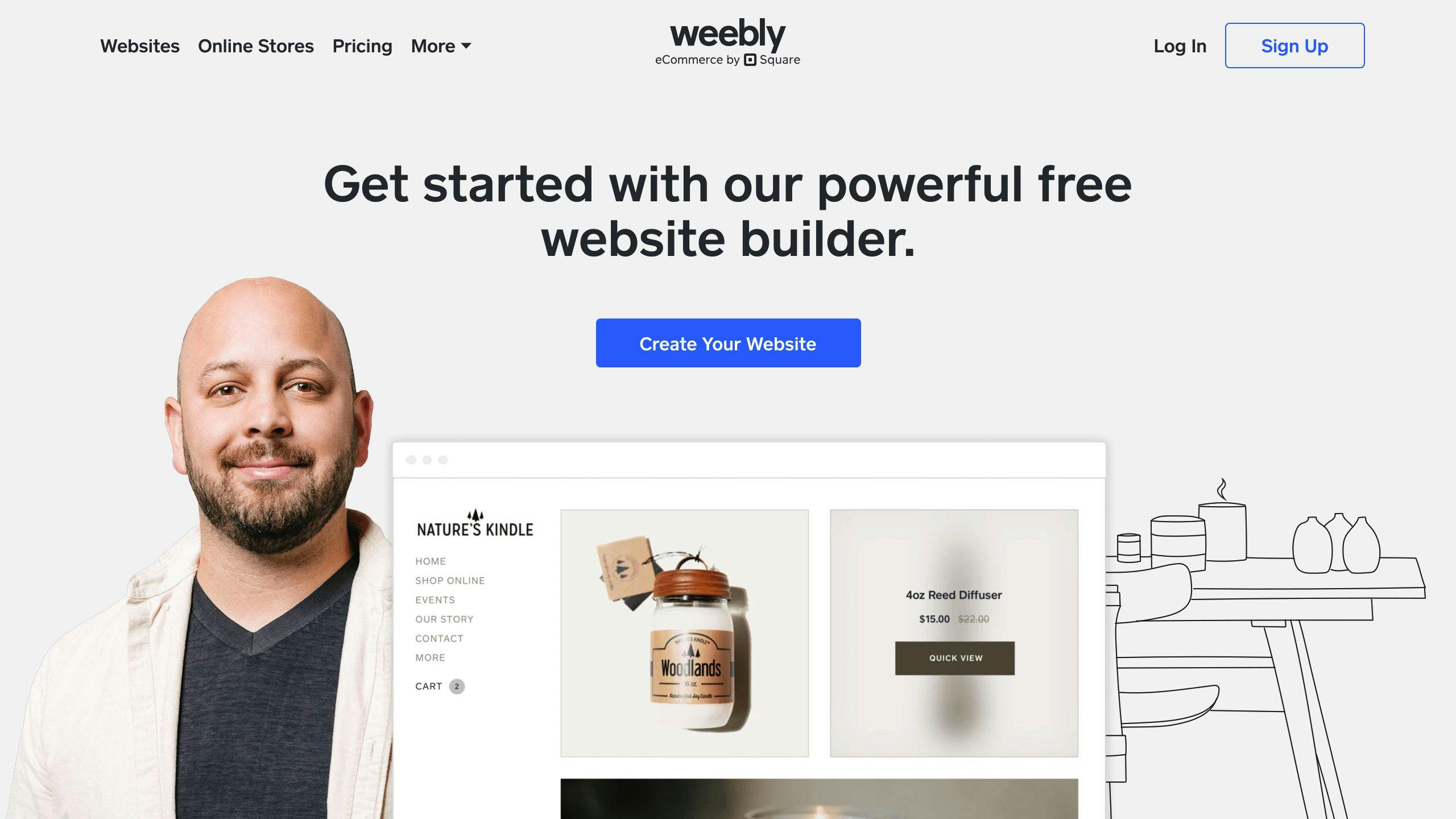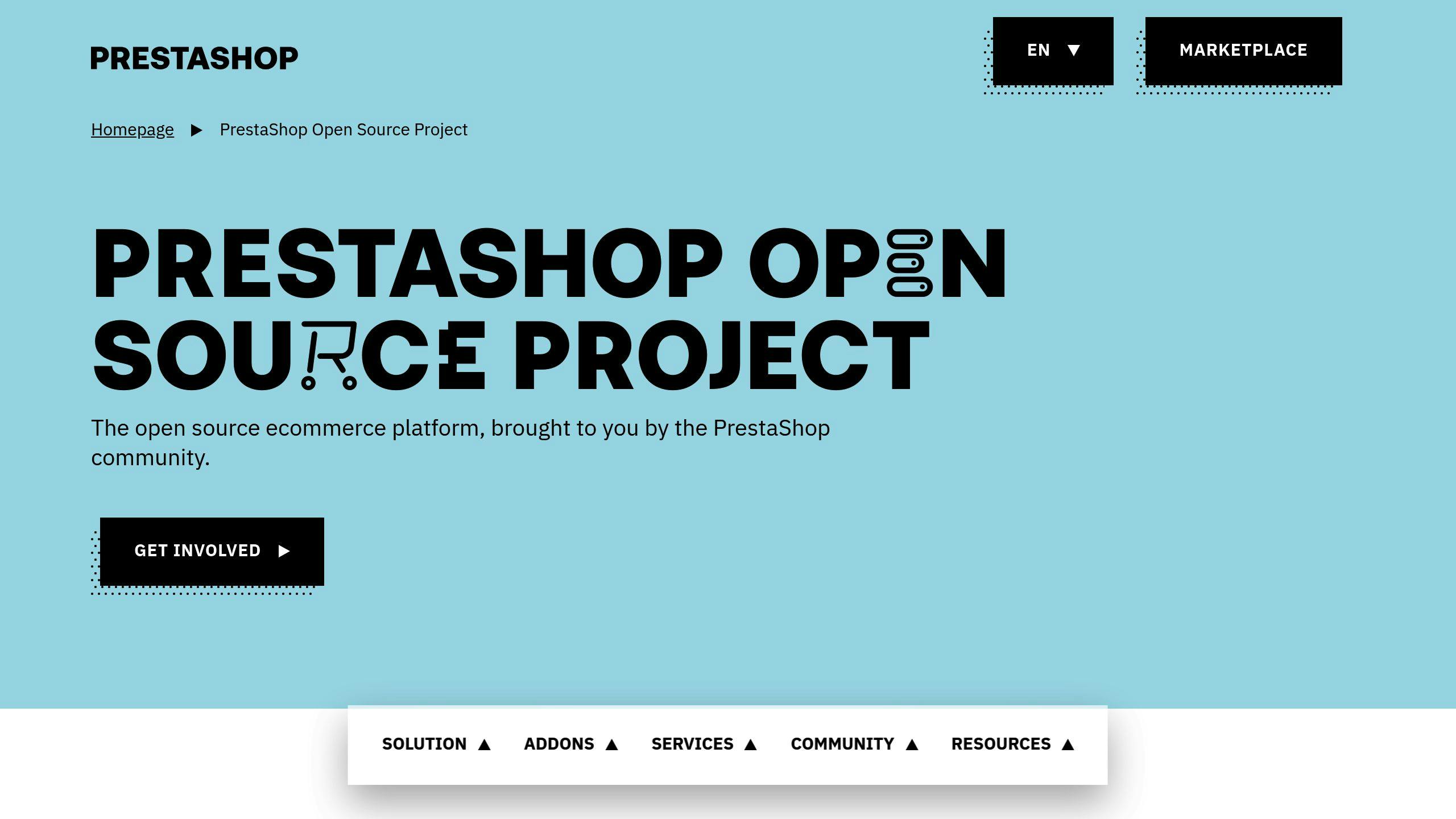In the competitive world of eCommerce, picking the right platform is crucial for improving search rankings and driving sales. This guide breaks down the 10 best eCommerce SEO platforms – from user-friendly options like Shopify and Wix to advanced tools like Magento and BigCommerce. Here’s what they offer:
- WooCommerce: WordPress integration, customizable SEO tools, and flexibility for small to large businesses.
- Shopify: Automated SEO features, responsive design, and AI-driven content tools.
- BigCommerce: Advanced control over SEO tools and scalability for large catalogs.
- Magento (Adobe Commerce): Enterprise-level SEO features for complex, large-scale stores.
- Squarespace: Simple, design-focused platform with built-in SEO tools.
- Wix: Easy-to-use interface with a personalized SEO assistant.
- Weebly: Affordable option for small businesses with basic SEO and blogging capabilities.
- Volusion: Strong technical SEO tools tailored for product-specific optimization.
- Shift4Shop (3dcart): Built-in blogging and advanced SEO for growing businesses.
- PrestaShop: Open-source platform with multilingual SEO for global markets.
Quick Comparison
| Platform | Best For | Key SEO Features | Ease of Use | Scalability |
|---|---|---|---|---|
| WooCommerce | Flexible customization | Meta tags, schema, XML sitemaps | Moderate | High |
| Shopify | Beginners, ease of use | AI tools, canonical tags, structured data | Easy | Moderate |
| BigCommerce | Large catalogs, growth | URL management, schema, redirects | Moderate | High |
| Magento | Large enterprises | Advanced SEO, category structures | Complex | Very High |
| Squarespace | Design-focused stores | Clean URLs, schema, blogging | Easy | Low |
| Wix | Small-medium businesses | SEO Wiz, sitemaps, structured data | Easy | Moderate |
| Weebly | Small businesses | Blogging, meta tags, sitemaps | Easy | Low |
| Volusion | Product-specific SEO | Canonical tags, meta tags, sitemaps | Moderate | Moderate |
| Shift4Shop | Growing businesses | Blogging, customizable meta tags | Moderate | Moderate |
| PrestaShop | Global markets | Multilingual SEO, responsive themes | Moderate | High |
Focus on platforms that align with your business size, SEO needs, and growth goals. Whether you want simple tools or advanced customization, this list has you covered.
Best Ecommerce SEO Platform? Shopify vs WooCommerce vs BigCommerce

1. WooCommerce
WooCommerce powers over 4.4 million active online stores and holds a 22% share among the top 1 million eCommerce sites. Built as a WordPress plugin, it provides businesses with a range of tools to improve their online visibility.
SEO Features
Thanks to its integration with WordPress, WooCommerce covers all the basics of SEO. It supports features like custom URLs, meta tags, XML sitemaps, and schema markup for rich snippets. This gives users control over key SEO elements.
By pairing WooCommerce with tools like Yoast SEO, store owners can take optimization to the next level, gaining access to advanced features that many standalone platforms can’t match.
Mobile Optimization and Performance
WooCommerce ensures your store performs well on mobile devices by offering:
- Themes designed with SEO in mind
- Tools for compressing images
- Support for caching plugins
- Compatibility with AMP (Accelerated Mobile Pages)
Analytics and Tracking Tools
With WooCommerce, tracking performance is straightforward. It integrates seamlessly with Google Analytics, Search Console, and WooCommerce Analytics, allowing businesses to monitor SEO efforts and sales data effectively.
Flexibility and Ecosystem
One of WooCommerce’s greatest strengths is its open-source nature. This makes it easy for businesses to adjust their SEO strategies as needed. A wide variety of extensions and plugins are available, enabling tailored solutions for specific needs.
Thanks to its adaptability and WordPress compatibility, WooCommerce remains a top choice for businesses looking to strengthen their SEO efforts. Up next, we’ll dive into Shopify, another major player in eCommerce.
2. Shopify
Shopify simplifies SEO for online store owners by automating many technical tasks. It automatically generates canonical tags to avoid duplicate content problems and creates XML sitemaps that can be submitted directly to Google Search Console.
Unlike WooCommerce, which thrives in an open-source environment, Shopify focuses on ease of use and automation. This makes it a great option for those who want a more hands-off approach to SEO. The platform includes built-in structured data markup, helping products stand out with rich snippets. Store owners can also tweak meta titles, descriptions, URLs, alt text, and schema markup for better optimization.
Shopify even uses AI to create SEO-friendly product descriptions and meta tags.
Mobile Optimization and Performance
Shopify ensures your store is mobile-ready with responsive themes, quick-loading pages, mobile-friendly checkout options, and AMP support.
Analytics and Tracking Tools
Shopify offers an analytics suite that monitors visitor behavior, keyword performance, conversions, and success across multiple channels. It also integrates with Google Analytics and Search Console, giving businesses access to deeper insights.
Content Marketing Capabilities
With its built-in blogging platform, Shopify allows businesses to craft content that resonates with their audience. By publishing helpful articles and strategically placing keywords, store owners can drive traffic and improve search rankings.
Shopify’s combination of automation, customization, and tracking tools makes it a strong choice for businesses looking to increase both visibility and sales. Up next, we’ll dive into BigCommerce, another eCommerce platform with robust SEO features.
3. BigCommerce
BigCommerce is an eCommerce platform that gives users detailed control over SEO tools while keeping things easy to use. Unlike Shopify’s more automated style, BigCommerce focuses on offering advanced features for those who want precise control.
SEO Features
BigCommerce simplifies crawling and indexing with automated XML sitemaps. It also boosts visibility using built-in schema markup for rich snippets and tools for URL management. These include customizable URLs, automatic rewrites, 301 redirect management, and editable robots.txt files.
Mobile Optimization and Performance
With a mobile-first design, BigCommerce ensures your site performs well on any device. It offers responsive themes and fast page loading speeds, meeting Google’s mobile-first indexing standards.
Analytics and Tracking Tools
BigCommerce comes with a robust analytics suite to track sales, traffic sources, conversion rates, and keyword performance. It also integrates smoothly with Google Analytics and Search Console for more in-depth SEO data.
Scalability and International SEO
One standout feature of BigCommerce is its ability to handle growth without sacrificing SEO performance. It’s built to manage large product catalogs and supports international markets with features like multi-language options and tools for global SEO.
Next, we’ll dive into Magento (Adobe Commerce), a platform known for its flexibility and enterprise-level SEO tools.
4. Magento (Adobe Commerce)

If your business handles a massive product catalog or needs advanced customization, Magento could be the platform for you. Its open-source framework gives you extensive control over your SEO efforts, making it ideal for large-scale eCommerce operations.
SEO Features
Magento comes packed with advanced SEO tools. You can customize meta tags, manage clean URLs, and create XML sitemaps tailored for large catalogs. Its architecture is designed to handle massive inventories, including complex hierarchies and category structures, ensuring your products stay organized and visible to search engines.
Mobile Optimization and Performance
Built with a mobile-first approach, Magento ensures your store is responsive and fast, even with an extensive product range. This focus on performance not only enhances user experience but also boosts search rankings – critical for large-scale businesses.
Analytics and Tracking Tools
Magento’s analytics suite gives you a clear picture of customer behavior, SEO performance, site speed, and organic revenue. It integrates smoothly with Google Analytics and other tracking tools. Plus, Adobe Sensei’s AI-driven insights provide additional data to fine-tune your SEO strategy and overall performance.
Magento’s customization capabilities and robust SEO tools are perfect for businesses with complex eCommerce needs. While it may require more technical know-how compared to other platforms, the control and flexibility it offers make it a strong choice for businesses aiming to dominate search engine rankings.
Though Magento shines for large enterprises, smaller eCommerce businesses might find Squarespace’s simpler, design-oriented approach a better fit.
5. Squarespace

Squarespace is a great fit for businesses that prioritize design while still needing solid SEO tools. Though it’s not solely an eCommerce platform, its features cater well to online stores that want a visually appealing site without losing out on search engine visibility.
SEO Features
Squarespace provides easy-to-use SEO tools, perfect for those without technical skills. It automatically creates clean URLs and sitemaps, making it easier for search engines to navigate and index your site. The platform also includes automatic schema markup, which can help display rich snippets in search results. You can customize meta titles, descriptions, and use its blogging tools to create keyword-optimized content.
Mobile Optimization and Performance
With responsive templates, Squarespace ensures your site looks and works great on any device. Its clean coding and image optimization contribute to faster loading times, enhancing the user experience and boosting search rankings.
Analytics and Tracking Tools
Squarespace comes with built-in analytics, offering insights into traffic sources, user behavior, and sales. For more advanced tracking, you can integrate Google Analytics to refine your SEO and marketing strategies.
Squarespace strikes a balance between elegant design and SEO functionality. It’s especially suited for small to medium-sized businesses that want a visually impressive, search-friendly online store. While Squarespace emphasizes simplicity and ease of use, platforms like Wix might appeal to those seeking more customization options.
sbb-itb-6768865
6. Wix

Wix blends easy-to-use design tools with strong SEO features, making it a solid option for eCommerce businesses. Its simple interface and SEO capabilities are especially appealing for small to medium-sized businesses looking to grow their organic traffic.
SEO Features
Wix’s SEO Wiz acts as a smart assistant, creating personalized optimization plans tailored to your business and industry. It simplifies key tasks like generating automated sitemaps, adding structured data markup, and managing meta titles, descriptions, URLs, and alt text for product images.
Mobile Optimization and Performance
With mobile search dominating consumer behavior, Wix ensures your site performs well on all devices. Its automatic image compression, built-in CDN, and responsive templates create a seamless experience for mobile users. The platform also generates mobile-optimized versions of your store, so your site looks great regardless of the device.
Analytics and Tracking Tools
Wix provides an analytics dashboard to track visitor behavior, keyword performance, and device usage. These insights help business owners refine their SEO strategies and boost conversions.
With a 4.5/5 rating on Trustpilot from over 12,000 reviews, Wix proves to be a reliable choice for eCommerce SEO. While it may lack the advanced customization options of open-source platforms, its broad range of features and straightforward interface make it a strong option for businesses prioritizing organic growth.
If you’re exploring alternatives, Weebly is another platform that combines simplicity with functionality for business owners.
7. Weebly

Weebly, purchased by Square in 2018, is a platform that blends ease of use with practical SEO tools. It’s especially well-suited for small businesses aiming to boost their online presence.
SEO Features
Weebly offers a range of SEO tools, including options to customize meta titles, descriptions, and URLs for product pages. It also automatically generates sitemaps. With built-in blogging capabilities, businesses can attract organic traffic by targeting niche audiences with long-tail keywords, helping them carve out a spot in their market.
Mobile Optimization and Performance
Weebly’s responsive templates ensure your site looks great and performs well on any device. Fast loading speeds further enhance search rankings, which is crucial for visibility on both desktop and mobile searches. This mobile-friendly approach ensures consistent performance across all platforms.
Analytics and Tracking Tools
The platform’s dashboard, combined with Google Analytics integration, provides detailed insights into visitor activity, sales trends, and search rankings. These tools allow businesses to make data-driven decisions and refine their content based on actual performance.
With plans starting at $12/month for eCommerce features, Weebly is an affordable option for small businesses building their online presence. It also includes SSL encryption for secure transactions, which not only boosts user trust but also supports SEO efforts.
While Weebly focuses on simplicity and cost-effectiveness, Volusion may be a better choice for businesses needing more advanced eCommerce functionalities alongside SEO tools.
8. Volusion

Volusion is an eCommerce platform tailored for online retailers, offering tools to improve search rankings and drive organic traffic.
SEO Features
Volusion stands out with its built-in tools designed for technical SEO. It automatically creates canonical tags to avoid duplicate content issues – something many eCommerce sites struggle with due to product variations. The platform also provides customizable meta tags, automatic sitemap generation, URL optimization, and tools for product-specific keywords. These features help improve search rankings, attract the right audience, and increase conversions.
Mobile Optimization and Performance
Volusion ensures strong mobile performance through features like:
- Optimized image compression
- Clean, efficient code
- A design approach focused on mobile users
- Responsive product galleries
This ensures your store looks and works great on any device.
Analytics and Tracking Tools
Volusion’s analytics dashboard offers data on traffic, conversions, keyword performance, and ROI. Plus, its API allows integration with third-party tools, giving merchants the flexibility to create customized SEO solutions without losing core functionality.
With its eCommerce-focused SEO tools, Volusion supports product page optimization, category management, and inventory handling to improve search rankings. While it’s a strong choice for online retailers, businesses looking to scale further might also consider Shift4Shop (formerly 3dcart) for additional features.
9. 3dcart (Shift4Shop)

Shift4Shop, previously known as 3dcart, stands out from platforms like Shopify or Wix by focusing on advanced SEO tools designed for businesses aiming to grow.
SEO Features
Shift4Shop makes handling technical SEO easier with options like customizable meta tags, optimized URLs, and automatic sitemap generation. Its built-in blog feature also helps businesses create content that improves search rankings and visibility.
Mobile Optimization and Performance
With mobile commerce leading the way, Shift4Shop ensures your store is ready with responsive themes and quick-loading pages. Its touch-friendly design and efficient coding deliver a smooth shopping experience across all devices, making it easier to attract mobile users.
Analytics and Tracking Tools
Shift4Shop works seamlessly with Google Analytics and includes built-in tools for tracking ROI, monitoring keyword performance, and analyzing real-time sales data. You can also integrate third-party SEO tools to expand your optimization efforts without losing access to the platform’s core features.
Shift4Shop is a solid choice for businesses looking for a mix of built-in SEO tools and customization options. Up next, we’ll dive into PrestaShop, a platform recognized for its flexibility and global appeal.
10. PrestaShop

PrestaShop is an open-source eCommerce platform powering over 300,000 active stores. With a 2.64% market share among eCommerce platforms, it continues to grow through regular updates and contributions from its community.
SEO Features
PrestaShop comes packed with tools to optimize your store for search engines. You can customize meta tags, create SEO-friendly URLs, and use automatic sitemaps to improve visibility. Plus, its multilingual SEO support helps businesses tailor their content for different regions, making it a practical choice for international merchants.
Mobile Optimization and Performance
With responsive themes, PrestaShop ensures your store looks great and works seamlessly on any device. Its architecture is designed for speed, which not only improves user experience but also boosts SEO rankings by keeping loading times fast.
Analytics and Tracking Tools
PrestaShop includes built-in analytics for tracking sales, understanding customer behavior, and measuring SEO performance. These tools also integrate with popular analytics platforms, giving you a comprehensive view of your store’s performance and areas for improvement.
"PrestaShop’s SEO features, such as customizable meta tags and SEO-friendly URLs, have been reported to significantly improve search engine rankings for various eCommerce businesses", notes industry experts familiar with the platform.
PrestaShop is a solid option for businesses looking for a flexible platform with strong SEO tools. Its customization options and multilingual capabilities make it especially appealing to companies aiming to grow their presence in international markets.
Conclusion
After reviewing the top eCommerce SEO platforms, it’s clear that selecting the right one can make a huge difference in your store’s online visibility and revenue.
For large businesses needing advanced features, BigCommerce offers options like built-in schema markup and detailed product filtering, making it a strong choice for complex needs. On the other hand, smaller businesses or startups might prefer Shopify for its user-friendly tools like AI-driven content creation and automatic sitemap generation, which make setup faster and easier.
The world of eCommerce SEO is shifting quickly, with artificial intelligence playing a growing role in tasks like content optimization and keyword analysis. However, the basics – like mobile optimization and technical SEO – are still essential for boosting rankings and driving sales.
When setting up your platform, focus on these key areas:
- Mobile Optimization: Most shoppers browse and buy on mobile devices, so your platform must deliver strong mobile performance.
- Technical SEO Tools: Features like customizable meta tags, SEO-friendly URLs, and automated sitemaps are must-haves.
- Content Creation: Use built-in blogging tools and AI-powered content creation features to craft engaging, SEO-friendly content.
Success in eCommerce SEO goes beyond picking the right platform. It requires ongoing effort, from following best practices to tracking results with analytics. Staying informed about new developments will help you stay ahead in the competitive online marketplace.
FAQs
Which SEO tool is best for Shopify?
Shopify store owners can boost their SEO by using a mix of the platform’s built-in features and external tools designed for specific tasks. Here are some top tools that work well with Shopify:
| Purpose | Recommended Tool | Shopify-Specific Benefit |
|---|---|---|
| Search Performance | Google Search Console | Tracks indexing and mobile performance for your store |
| Traffic Analysis | Google Analytics | Offers insights into visitor behavior and conversions |
| Keyword Research | Google Keyword Planner | Finds valuable search terms for your product pages |
| Rank Monitoring | Ahrefs | Monitors competitor rankings and keyword opportunities |
| Technical SEO | Screaming Frog SEO Spider | Flags technical issues unique to Shopify |
Shopify’s automatic sitemap generation works seamlessly with Google Search Console, ensuring your store is properly indexed and performing well. While Shopify handles the basics on its own, these tools provide more targeted improvements:
- Technical Fixes: Screaming Frog helps identify and solve technical issues specific to Shopify.
- Tracking Progress: Google Analytics and Search Console together give a clear picture of your store’s SEO performance.
- Competitor Insights: Ahrefs uncovers opportunities by analyzing competitor strategies.

